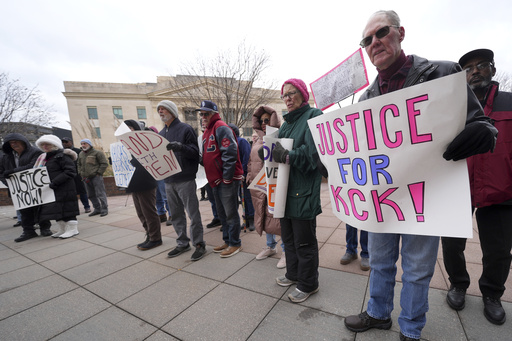
A former police detective from Kansas, Roger Golubski, was found dead in an apparent suicide just as he was poised to face a trial over serious allegations including sexual assault against vulnerable women. Authorities discovered his body on his back porch after a neighbor reported hearing a gunshot. The Kansas Bureau of Investigation confirmed there were no signs of foul play, but the circumstances surrounding his possession of a gun during house arrest have sparked significant questions. A judge had explicitly prohibited Golubski from having any firearms, destructive devices, or weapons while awaiting trial.
The timing of Golubski’s death raised concerns since jury selection was scheduled to begin at the federal courthouse in Topeka. Law enforcement officials have stated that they will investigate how he came to possess the firearm despite his legal restrictions. Melissa Underwood, a spokeswoman for the Kansas Bureau of Investigation, mentioned that the acquisition of the gun would be a part of their investigation into his death.
Golubski, a former detective previously held in high regard, faced serious charges stemming from allegations of abuse dating back decades. In September 2022, he was indicted on six felony counts related to violating the civil rights of multiple women and girls. Prosecutors asserted that Golubski had subjected these victims to sexual abuse and intimidation, with threats of imprisonment for themselves or relatives if they resisted. His trial was set to spotlight the accounts of two women: one had been victimized in her middle school years, while the other experienced abuse shortly after her sons were arrested. Furthermore, seven additional women were prepared to testify regarding their own experiences of abuse or harassment by Golubski.
The allegations suggested that Golubski, who is white, preyed on Black women and girls in some of the most impoverished neighborhoods of Kansas City. His prosecution came amid a broader movement across the nation that scrutinized law enforcement officers for alleged sexual misconduct. Following Golubski’s death, the judge promptly dismissed the case upon the request of the prosecutors.
Initially, there were calls for Golubski to be jailed promptly after his indictment; however, U.S. Magistrate Judge Rachel Schwartz ultimately ruled against immediate incarceration. The judge regarded the allegations as alarming but concluded that Golubski posed less risk than he had in the past. His attorney argued that he was in poor health, requiring medical treatment for diabetes and kidney issues, and had recently undergone heart surgery. His legal obligations for trial coincided with his medical appointments, factoring into the decision to allow him to remain under house arrest rather than detention.
Despite the restrictions placed on Golubski, his accusers expressed dissatisfaction with the perceived leniency afforded to him during house arrest. At one point, he was spotted at a restaurant after a medical appointment, which incited further anger amongst those pursuing justice for his alleged victims. Revisions to the terms of his house arrest were made after this incident, though he was never ordered to be physically detained. Critics pointed out that had the roles been reversed, individuals in similar circumstances may not have enjoyed the same freedoms.
Questions surrounding the acquisition of the firearm remained unanswered. Legal experts speculated whether thorough searches were conducted upon his initial house arrest, acknowledging that while there may have been oversight, there was no continuous surveillance of his home. With the nature of house arrest, it was possible for others to visit, possibly introducing elements that could lead to the illegal possession of a weapon.
Golubski had a lengthy career with the Kansas City police department, culminating in his retirement in 2010. He subsequently worked with the Edwardsville police until 2016. According to authorities, while officers are issued firearms by the department, there was no record of Golubski possessing a weapon upon his departure from the Edwardsville police.
As Golubski’s state of mind became a point of discussion, his lawyer indicated that there were no visible signs of distress. Golubski’s death should not be misconstrued as an admission of guilt, but rather as a stark reminder of the media’s influence on public perception, according to his attorney.
Moreover, Golubski was embroiled in multiple lawsuits and allegations that prompted a thorough review of cases he handled during his career. High-profile outcomes from his even questionable leads had already raised significant doubts about his professional conduct. The road to justice for the victims who chose to come forward remains fraught with challenges, as Golubski’s death has interrupted what many viewed as a crucial step toward holding law enforcement accountable for their actions.
